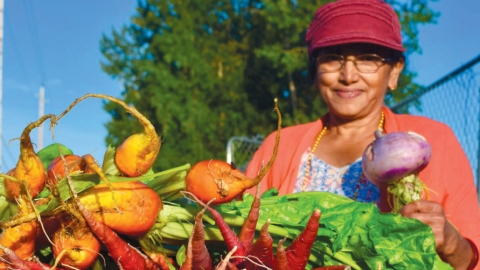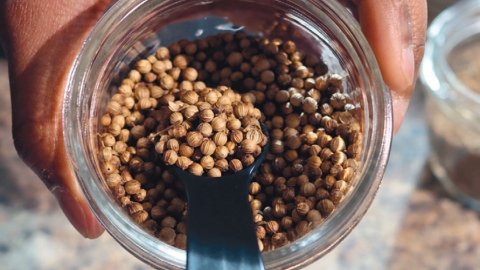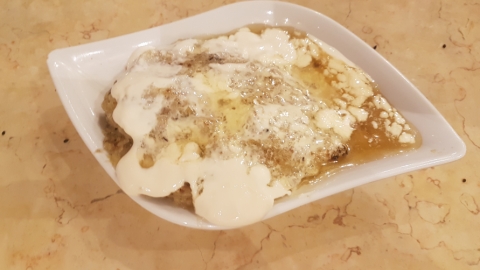Camel to Salmon: A Journey in Food from Somalia to Alaska
Food is important because it will tell you about the people who live in the place,” says Mahdi Akal. “You will learn about the environment, the culture.” Akal has lived this insight throughout his remarkable journey from his home country of Somalia to his new home in Alaska, where he has lived since 2014.
Akal’s 14-year journey from Somalia to the 49th state spans six countries and two continents. His is a journey from refugee to U.S. citizen, a journey that takes him from hot, arid land, to snowy, mountainous tundra. His is a journey of profound resilience and accomplishment. It is also a journey from hearty bowls of stewed camel and goat meat with rice to bowls of salmon and local greens. Throughout his journey, Akal has learned about people and places by gathering recipes and ingredients. And now, in his Alaska home kitchen he cooks up an international cuisine distinctly his own.
I had the chance to learn about his story and the many flavors of his kitchen through our work together at the Anchorage Museum, where he is an Educator. Akal is an incredible storyteller, full of animation and detail, but without any embellishment.
Akal’s journey to Alaska began in a small village in south Somalia. He grew up raising sheep, goats, and camels, and growing corn, sugarcane, and rice. When I ask Akal to tell me what home tasted like, he smiles, and immediately describes a specific dish: goat meat stewed with brown rice, and a mix of what Akal calls “Somali spices:” cumin, coriander, black pepper, fennel seed, and turmeric. Toasted and ground freshly, these aromatic spices add richness to the umami flavor of the goat meat, and those flavors are absorbed into the rice that makes up part of the dish. The goat came from animals he and his father and brothers tended. The Akal family is Muslim, and in following Islamic law, all of their animals were butchered in accordance with halal practices, meaning, among other special practices, the animal is butchered swiftly, with a sharp knife by an approved halal butcher, and drained of blood.
Akal eagerly tells me not just about this delicious goat stew, but dishes made with camel. The Akals’ camel herd provided milk for the family, and, for important occasions, meat. The herd was a special point of pride. As Akal told me, “In Somalia, if a person owns camels, we look at him as a rich person because we know the camel is a big deal in Somalia. We don’t have camel meat unless it is a wedding, or big celebration, or holiday, or a very important guest.” Akal’s childhood connected him with the animals and crops that flourished in southern Somalia.
In his village, sugarcane was a favorite sweet. The stalks of this perennial grass were so coveted that Akal’s mother, Ameena Akal, hid them in black trash bags so that children in the village would not gorge on them. Instead, the canes could be portioned out by Ameena’s generous but judicious hand.
The Akal family had a large farm, producing enough crops, camel milk, and animals to sell in larger, nearby communities. These trips offered opportunities to taste other flavors, in particular custard. This yellow, eggy treat remains a favorite of Akal. He grins when telling me about devouring this special treat as a child on journeys into town and on special occasions. He has an admitted sweet tooth. Now, Akal makes custard sometimes on weekends for his family here in Anchorage. It’s a bit of a project, though, he says with a laugh. “It’s tiring because you have to keep stirring all the time.”
Akal’s childhood farming and learning from the land were disrupted by civil war. The Somali Civil War, an ongoing conflict with roots in resistance to the military junta led by Siad Barre in the 1980s, continues to profoundly impact the country. Following a period of increased stability in the early 2000s, violence erupted in 2006 in south Somalia. Akal was just 12 years old when his homeland was ravaged from open war and his family torn apart. His older brother was separated from the family. They lost contact with him until 2012. Akal assumed he had been killed, though Akal was quick to tell me that his mother was always certain his brother was alive. His brother, placed in safety by the United Nations (UN), now lives and works in Ireland.
The proliferation of violence in Somalia led Akal and his family to flee to safety over the border to Ethiopia, where they stayed for three months. Akal recounts how that brief time introduced him to new lifeways and foodways. He met people from different cultures, saw a church for the first time, and encountered women without hijab. And, he remembers, laughing, “The food was very spicy.” But, Ethiopia was not a safe place for Akal and his family to stay. Ethiopia’s escalating involvement in the Somali conflict meant that the Akals had to cross borders again, this time to Sudan. There, Akal was immersed in the Arabic language, in which he is now fluent, in addition to English and his mother tongue of Somali. Sudan is a largely Islamic country, so despite the foreign language, Akal connected with people and culture through faith. The taste of Sudan offered new flavors, in particular white corn. Akal’s eyes light up as he describes how surprising it was to see corn that was not yellow. Hand-ground white corn flour was used to make asida ( ) a thick, porridge-like dish that Akal recalls having with yogurt. Akal loved the dish so much that he learned to make it for his family. He is grateful that corn flour can be purchased in Anchorage at Fred Meyer.
The Akal family’s time in Sudan was also short-lived. Without appropriate papers or passports, they were hardly situated to build a new life there for themselves. They sought to travel to a place with more resources. They heard the UN office in Libya might offer an opportunity. The Akal family found reprieve there for just three years, until the Arab Spring began. A series of protests and uprisings beginning across the Middle East and North Africa in 2010, the Arab Spring challenged existing authoritarian regimes, and sparked violent retaliation. Everyone not from Libya was forced to leave, and the Akal family had to relocate again.
The family crossed the northern border of Sudan into Egypt, arriving in Cairo. Akal’s already animated storytelling becomes even livelier when he gets to this part. “I could talk about Cairo for hours and hours,” he says. Cairo is an international city of about 10 million people. With so many people come many dynamic flavors. “Cairo is a big city, so you will see people from all the Arabic regions and they all have their own restaurants.” When talking about the flavors of Cairo, he starts with dessert first.
In Cairo, he tried rice pudding for the first time, and tasted a favorite dish, masoub ( ), which Akal found at a Yemeni restaurant. “I went there many times. Masoub tastes very, very good and I still make it here. I introduced it to my family and they all like it.” Masoub (also masoob) is a banana bread pudding made with ripe bananas, ground bread, and cream and served warm. In Cairo, Akal also discovered a favorite grain salad at a Syrian restaurant—a kind of tabbouleh of soaked bulgur, mint, cilantro, tomato, green onion, and lemon. Akal makes a big batch on the weekends and eats it throughout the week.
Akal also discovered he loved Egyptian spinach (Corchorus olitorius) in Cairo. Consumption of this herbaceous annual cultivated across Africa and Asia dates back thousands of years. When cooked, the leaves release a thickening agent, as okra does, which adds body to soups and stews. Akal fell in love with this mildly bitter green. Here, in Anchorage, he buys frozen Egyptian spinach shipped all the way from Alexandria, Egypt. It does not grow well in Alaska’s climate, but Akal gave me a taste of the fresh green by growing it in the Anchorage Museum’s Vertical Harvest hydroponic unit. He sent me home with a bundle. I quickly realized that the fibrous stalks were not for eating, but I learned they are used as a primary source for jute fiber. The flavor of the leaves is complex, and the texture holds up to long cooking and bold spices. Akal has a particular recipe for Egyptian spinach that calls for a variety of spices and brings out the bitter, rich taste of the green. Akal loves Egyptian spinach so much that he even led a whole two-hour workshop on the growth and use of it, at the Anchorage Museum as part of the Urban Harvest class series which connects contemporary Alaskan lifeways and foodways to their histories and contexts.
While Akal loved the flavors of Cairo, the city was challenging for his family. On January 25, 2011, the Day of Revolt, non-violent protesters staged marches, occupations, and acts of civil resistance and disobedience, demanding the removal of Egyptian President Hosni Mubarak. Violence ensued, with Cairo at the center of the unrest. But Akal’s family had no papers and had nowhere else to go. The Mediterranean Sea lies north of Cairo, with Israel to its east. “So we were kind of stuck there. As a family, we just had to wait.” The Akal family remained in Cairo until 2014.
Then, through an email, an opportunity came: “Thankfully, the email came from the United Nations that said, ‘You are going to Anchorage, Alaska.’” Akal laughs as he relays this part of the story. “So, here is a new place to go to.” As refugees fleeing violence, the email from the UN promised a chance to begin a new, stable life.
While the Akal family was eager to finally leave behind violence and unrest, but they knew little of Alaska. “I knew there was a place called Alaska, but I didn’t know that Alaska was part of the United States. I thought it was separate.” Akal had seen maps that placed Alaska in the Pacific Ocean, south of the United States. He assumed that Alaska was a tropical island. Akal says, laughing, “The worst part is, I told all my friends I am going to the south, to a place near Mexico, where it would be hot, because I didn’t look at pictures of Alaska. And, everyone I talked to believed it.” Even his mother. His family began to prepare for their move to the tropics.
A friend who was studying in Cairo was a bit more familiar with United States geography. According to that friend, Alaska “‘is north and it is cold, and there are no people there. It is just trees.’” Akal looked up Alaska again, and realized, indeed, he was not going to a warm island. “I had to go back to all my friends and tell them. And also tell my mom. So, we were worried about living in the U.S.” The prospect of the cold, unpeopled lands, which his friend described, in what Akal and his mother had already heard, to be a country with an unfavorable environment for practicing Muslims, concerned Akal and his family.
“I talked to my mom and discussed if we should ask to have the place changed, or just say no, we don’t want to go. But in 2014, in Cairo, it was not safe for us to live. So we decided not to say anything, because the UN may change their mind, and we would be stuck in Cairo forever.” Akal and his family decided to immigrate. As Akal described, since they had moved so much, if Alaska was not a good place for them, they could just move again.
And so, Akal and his family made the long journey from Cairo to Anchorage. They were surprised when they arrived. Akal smiled as he remembers realizing that “there are people who live here, and schools, and shops, there are restaurants! So we liked it. My family liked it. And, so we are going to stay in Alaska for a very long time.”
Alaska opened up a whole new array of flavors for Akal to add to his culinary repertoire. When I asked him what his new home tastes like, he immediately said, “SALMON.” His face grows serious for a moment, “I have had more fish in Alaska than my entire life.” He loves salmon, though, especially when roasted with his special Somali spice blend. In Alaska he also tried radish and avocado for the first time. And, he had his first mushrooms—at my house, I would proudly add.
But, with all the new foods to be tried and had in Alaska, some favorites prove harder to find. Essential to Akal’s special spice blend is turmeric, which he had learned to be “curcuma” (the species name) in English. He scoured markets until he finally found a spice bottle with an image he recognized. As Akal says, as he learned about food in each place he travelled, “I also learned different names for the same thing. I have to keep up!” One food in particular, though, was important to Akal and his family to find in Alaska—camel meat. I assumed that celebratory food for the most important occasions would be impossible to acquire here in Anchorage. But, I was wrong. Akal told me that camel meat can be purchased for special occasions through a halal market. Camel is not usually found on the shelf. The shop owner calls Akal for pickup when the order comes in.
Upon arriving in Alaska through Refugee Assistance and Immigration Services (RAIS), Akal became involved in Fresh International Gardens, a project which supports immigrants and refugees gaining practical farming skills for Alaska. The Akal family arrived in Alaska with rich knowledge of how to grow things, just in a different climate. Now, Akal, his mother Ameena, and his little brother have a stand at the Mountain View and Muldoon farmers markets in Anchorage each growing season. Akal describes, “My mother is kind of the supervisor. She ‘manages’ us. We harvest the day before and wash the vegetables to prepare for selling the next day. And, when we are there we learn from other farmers—what they are growing.”
Akal brings all that he has learned about growing and cooking food to his own kitchen. I ask him if he has a favorite restaurant, and he replies, “We don’t go out so much. We like to cook at home.” I have to say, I do not blame him. His kitchen weaves together ingredients from near and far. At the museum, each day he brings a lunch that beats everyone else’s, a lunch rich with spices and colors. I would know, my office is right next to the break room. Each day, Akal brings more than a delicious lunch to work. He beams with positivity. He welcomes learners of all ages, making them feel welcome. He facilitates programs about topics ranging from robotics, to Arctic science, to growing Egyptian spinach. And, whatever he is doing, he shares the knowledge and wisdom gathered from his international journey, from camel to salmon, with us all.
Akal was naturalized in January of this year. Now, a U.S. citizen, he has freedom to travel, to explore new flavors. After seven years, he finally can traverse international borders and visit his other brother from whom he was separated in 2006, now living in Ireland.
Akal is thinking of the future. “I have a dream that one day I will have a big farm in Alaska. I know camel will not survive in Alaska, but….”









